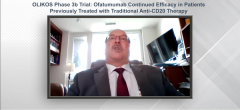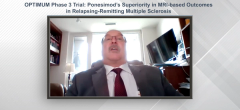
COVID-19 in MS Global Data-Sharing Initiative Anti-CD20 Therapy Results
Episodes in this series

A discussion of COVID-19 in MS global data-sharing initiative and its significant preliminary trial data on anti-CD20 disease-modifying therapies.
Bianca Weinstock-Guttman, MD: We are all concerned with COVID-19 [coronavirus disease 2019], every one of us, and specifically as providers for MS [multiple sclerosis] patients. There are many registries going on today trying to determine the risk of MS patients developing COVID-19. Sure enough, many patients have a COVID-19 infection. We want to know how they are doing and if the disease-modifying therapies [DMTs] the patients are on is making a difference.
The preliminary data from this big data-sharing registry showed the older age, progressive MS, and higher EDSS [Expanded Disability Status Scale] were associated with a higher frequency of severe outcomes. The anti-CD20 DMTs—patients on ocrelizumab and rituximab—were also associated with higher hospital admission risk. The adjusted prevalence ratio was higher on ocrelizumab, 119; rituximab, 158. Higher ICU admission was 3 times more for ocrelizumab and 4 times more for Rituxan. The need for artificial ventilation risk was 3 times more for ocrelizumab and 7 times more for Rituxan. This was compared with the dimethyl fumarate.
Further analysis was looking for all 3 outcomes as related to negative adverse effects with ICU [intensive care unit] admissions being associated with both anti-CD20 treatment compared with the other DMTs. All 3 outcomes combined for patients treated on anti-CD20 vs the rest of the treatment showed higher hospitalization rate, 149 adjusted prevalence ratio; ICU admission, 2 times more; and ventilation need, 3 times more. Additional increased risk, compared with natalizumab, was 199 higher risk for hospitalization; 2 times more for ICU; and ventilation, 2.84.
An additional thing that I didn’t present is that although the anti-CD20, also ocrelizumab, as well as Rituxan, show a higher risk for complication from COVID-19, it still seems that ocrelizumab had fewer adverse effects than Rituxan. It’s not clear why. The presenter considered that this may be related to the difference in the way the 2 anti-CD20 therapies are binding to their receptor. The consideration is that Rituxan binding to the receptor in the same area of the anti-CD20 is stronger, so that could eventually explain why the patients on Rituxan were having more difficulties and more complication from the infection vs the patients that were treated with ocrelizumab.
Newsletter
Keep your finger on the pulse of neurology—subscribe to NeurologyLive for expert interviews, new data, and breakthrough treatment updates.

























